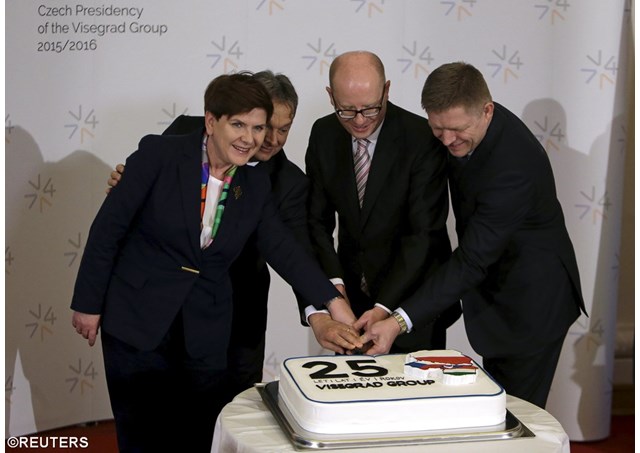
Balkan nations warn EU of tougher anti-refugee measures

(Vatican Radio) Prime ministers of four Central and Eastern European countries have agreed on a controversial plan to effectively close the crucial Balkan route to refugees if in their words Greece is not able to protect its outer border. The announcement came at a summit of the leaders of Hungary, Poland, the Czech Republic and Slovakia, who form the Visegrad Group, as well as Macedonia and Bulgaria.
Listen to Stefan Bos' report:
The leaders used the 25th anniversary of their Visegrad Group, named after a Hungarian castle town, to unveil plan B, ahead of an upcoming European Union summit starting Thursday.
It is meant to create a new barrier on Macedonia and Bulgaria's borders with Greece. That includes building fences and boosting security.
Hungarian Prime Minister Viktor Orbán told reporters that these measures are needed if Greece fails to protect the outer border of the EU's visa free Schengen zone and a European Union deal with Turkey does not result in substantially reducing the number of migrants. "The question whether we would build a second defense line between Turkey and the current Schengen border," he said.
Big question
"That is the big question for the future, for the upcoming European Union summit and for weeks and months to come. Hungary can offer its total support, be it financial, military or defensive to support such a building of a second line of defense that would be to the south of Hungary," the prime minister added.
Yet, the plan is controversial. Critics say it effectively eliminates Greece from the Schengen zone and is a direct attack on German Chancellor Angela Merkel's more welcoming attitude towards refugees, though the Visegrad countries insist it is not aimed at any EU nation.
Macedonian President Gjorge Ivanov and Bulgarian Prime Minister Boiko Borisov were also present at the summit in Prague, despite EU anger over their presence.
Hours before the Prague meeting the European Commission, the EU's executive, unveiled a further 10 million euros ($11.3 million) in finances to help Macedonia improve its borders and migration management. But European Commission spokeswoman, Tove Ernst warned: "We would to highlight in particular that this assistance will not help to finance the construction of any fence and that the Commission's work is aimed at managing borders and not closing them," she said.
New report
However Hungary says it already supplied Macedonia with about 100 kilometers of razor-wire, part of was produced by inmates. The country also sold razor-wire to Slovenia and is ready to supply other European countries if required.
Hungary has some experience: It has been building fences along its borders with Croatia and Serbia and Hungarian Prime Minister Orbán told Parliament he wants to boost the structures and border security, involving police and army personnel, ahead of an expected migration influx this spring.
Orbán also said that Hungary wants to see Bulgaria joining the Schengen Zone, and that "sensible talks" should begin on Macedonia's EU membership.
He and other Visegrad leaders also made clear they oppose an EU plan to redistribute as many as 160,000 refugees among member states.
Analysts say the Hungarian prime minister's position has become stronger after a right-wing government was elected in Poland, which shares his anti-migration views.
| All the contents on this site are copyrighted ©. |


